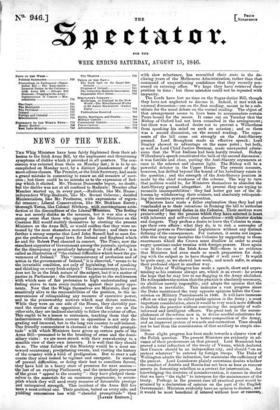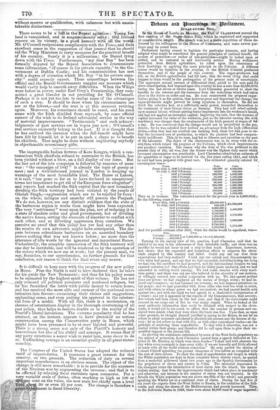NEWS OF THE WEEK.
THE Whig Ministers have been fairly frightened from their ad- hesion to the Irish Arms Bill, by the unpleasant and threatening symptoms of dislike which it provoked in all quarters. The con- cession was extorted from them on Monday last ; it is to be ac- complished on Monday next, by a distinct Abandonment of the more odious clauses. The Premier, or the Irish Secretary, had made a grand mistake in consenting to renew an old measure of coer- cion; but there could be no mistake as to the expression of feel- ing which it elicited. Mr. Thomas Duncombe began no doubt; but the dislike was not at all confined to Radicals : Member after Member started up, in every part,—Radicals' like Mr. flume; independent Whig-Radice* like Mr. Bernal Osborne ; decided Mini.sterialista, like Mr. Protheroe, with expressions of regret- ful censure ; Liberal Conservatives, like Mr. Bickham Escott ; thorough Tories, like Colonel Sibthorp, with contemptuous satis- faction at the discomfiture of the LiberaraMinisters. 'The feeling was not merely dislike to the measure, but it was also a very strong sense that those who opposed the late Ministers on the Coercion Bill would stultify' themselves by abetting the present Ministers on the Arms Bill, or would confess that they were ac- tuated by the most shameless motives of faction ; and there was further a strong surprise that Lord John Russell had so soon for- got the profession of equal laws for Ireland and England which be and Sir Robert Peel chanted in concert. The Tines, now the stanchest supporter of Government among the journals, apologizes for the discrepancy as peculiarly belonging to Irish affairs: it is called an illustration of "the eternal difficulties which beset the go- vernment of Ireland." This "inconsistency of profession and of action in the government of Ireland," it is observed, "seems to be the invariable condition, not only of legislating, but of speaking and thinking on every Irish subject." The inconsistency, however, does not lie in the Irish nature of the subject, but it is a matter of parties in Parliament : the illustration applies to the recklessness with which men of fair pretension to high understanding and feeling strive to turn every incident against their party oppo- nents. Now that the Whigs themselves are Ministers, they are sensitively alive to the responsibilities of the position, to the in- convenience of relinquishing any resource of executive power, and to the praiseworthy motives which may dictate coercion. While they were on one side of the House, they slavishly pur- sued the routine of an opposition ; now that they are on the other side, they are inclined slavishly to follow the routine of office. This ought to be a lesson to statesmen, teaching them that the indiscriminate vilification current in opposition is not only de- grading and immoral, but in the long run counter to self-interest. One friendly commentator is charmed at the "cheerful prompti- tude" with which Ministers have given up certain parts of the Arms Bill—presumed to be the branding. of arms and the domi- ciliary visits : we are more struck with their reawakening to a sensible view of their on interests. It is well that they should tlo so. The utter failure of this Ministry would be a most un- toward occurrence; precipitating events, and visiting the history of the country with a kind of predigestion. But to steer a safe course they must indeed be vigilant and energetic. In staving off present difficulties or doing their best to conciliate favour, they have laid in a heavy store of promises for next session— the last of an expiring Parliament, and the immediate precursor of the great "appeal to the country " : they have pledged them- selves to the materials for an enormous programme, to accom- plish which they will need every resource of favourable prestige and unimpaired strength. This incident of the Arms Bill has been a most critical one. Their position, baited on every side, and yielding concessions less with "cheerful promptitude" than with slow reluctance has resembled their state in the de- clining years of the Melbourne Administration, rather than that command of unquestioning confidence that they recently pos- sessed on entering office. We hope they have retrieved their position in time : but these mistakes could not be repeated with impunity. The Lords have lost no time on the Sugar-duties Bill, though they have not neglected to discuss it. Indeed, it met with an unusual discussion—one on the first reading, meant to be a sub- stitute for the usual debate on the second reading. The object of that arrangement seems to have been to accommodate certain Peers bound for the moors. It came out on Tuesday that the Bishop of Oxford had not been consulted in the arrangement ; but there was a marked desire not to prevent a Wilberforce from speaking his mind on such an occasion ; and so there was a second discussion, on the second reading. The oppo- nents of the bill came out strongly on the Anti-Slavery ground. Lord Brougham made an effective speech ; Lord Stanley showed to advantage on the same point • but both, as well as Lord Chief Justice Dlenman, made unexpected admis- sions that the West Indians had been hardly treated. Bishop Wilberforce's speech constituted the bulk of the second discussion : it was forcible and close, putting the Anti-Slavery arguments at once in the soberest and clearest light. The Bishop will be, a powerful debater in the Upper House The present measure, however, has drifted beyond the bound of his hereditary estate in the question ; and the strength of the Anti-Slavery position its made by the chief weakness of the scheme. The way to tam that position would be, for Ministers themselves to abandon the Anti-Slavery ground altogether. At present they are trying to reconcile incompatibilities : they had better get out of the di- lemma by withdrawing their cruisers, and. absolutely relinquish- ing the coercive system of prevention. Ministers have made a fuller explanation than they had yet vouchsafed as to their intentions in framing the bill to authorize the repeal of Imperial duties in the Colonies. Their motives were praiseworthy ; hut the process which they have selected is beset with inherent and self-evident absurdities—with ulterior doubts and dangers. They profess a desire to leave the Colonies to man- age their own affairs : what they do, is to risk a surrender of Imperial powers to Provincial Legislatures without any distinct defining of the consequences. For instance, it seems not impos- sible that they may tantalize the Colonies by suggesting to them enactments which the Crown must disallow in order to avoid angry questions under treaties with foreign powers. Here again —as in the case of the Irish Arms Bill—there is no evidence that Ministers had even made so much preparation for deal- ing with the subject as to have thought it well over ! It weuld. be quite easy, as we showed last week, and much safer, to attain their professed object in another way. The Duke of Wellington has made a speech, short and unpre- tending as his orations always are, which is an event : he avows the hope that he' may live to see flogging in the Army abolished. He relinquishesthe notion that the practice is absolutely necessary, its abolition merely impossible; and adopts the opinion that the abolition is inevitable. This indicates a vast progress since the Duke maintained the very opposite opinions before the Com- mission on Military Punishments in 1836. It will have immense effect on what may be called public opinion in the Army ; a moat important consideration, since it would be very much more difficult to abolish the practice without convincing the majority of well- informed and intelligent officers. The great task 111 the accom- plishment of the reform now is, to devise needful substitutes for that bad coercion—means to a better composition of the Army, and an improved system of rewards and correctives. Time should not be lost from the consideration of that auxiliary to simple abo- lition.
Some slight progress has been made towards a clearer view of the Polish question. The present Ministers are evidently in ad- vance of their predecessors on that ground. Lord Beaumont has proved a total infraction of the treaty of Vienna, which declared. that Cracow should be an independent city, and should "on no pretext whatever" be entered by foreign troops. The Duke of Wellington admits the infraction, but maintains the sufficiency of the pretext. Lord Lansdowne plainly entertains doubts whether the conduct of Austria and Russia has not been as base as rumour asserts in fomenting rebellion as a pretext for intervention. Ac- knowledging the doctrine of nonintervention, it cannot be denied. that we have "the right" to interpose for the maintenance of the treaty. Perhaps in the present case all practical good would be attained by a declaration of opinion on the part of the English Government : Ministers evidently have an opinion to declare; and it would be most beneficial if uttered without heat or rnocour,...:_ without reserve or qualification, with calmness but with unmis- takeable distinctness.



























